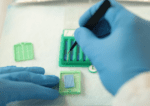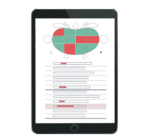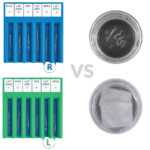The way core needle biopsies are collected and transported hasn’t changed much in decades… until now. Lumea’s BxBoard® is a revolutionary, simple device designed to replace messy, inefficient formalin jars. It improves tissue quality, ensures orientation, and streamlines the entire workflow from the procedure room to the pathology lab. The BxBoard system sets a new standard for specimen integrity, ultimately leading to more confident diagnoses and better patient care.
What is the BxBoard?
The BxBoard is an innovative, formalin-sparing replacement for traditional formalin bottles, specifically designed for collecting and transporting core needle biopsies. It consists of a rigid board with site-specific lanes where tissue cores are laid flat on a formalin-soaked sponge. A transparent lid secures the board and ensures formalin preservation for safe transport.
What makes BxBoards better than formalin jars?
BxBoards offer significant advantages in tissue quality, orientation, and safety:
- Maintains Orientation: Biopsies lie flat in individual lanes, ensuring they maintain their original orientation. This is crucial for precise diagnoses, as it allows pathologists to determine the exact distribution of disease along the core (e.g., distinguishing capsule from deep tissue).
- Improves Tissue Integrity: By holding the cores flat, the BxBoard dramatically reduces tissue curling, coiling, and fragmentation that often occurs when samples free-float in jars. This leads to higher diagnostic accuracy and fewer recuts.
- Reduces Formalin Exposure: BxBoards contain significantly less formalin (33–47% of a small bottle). They reduce the need for staff to handle and dispose of large amounts of liquid formalin, leading to a safer, more eco-friendly lab environment.
- Saves Time and Containers: A typical 12-core prostate case, for example, only requires two BxBoards instead of 12 separate jars and labels, simplifying workflow for clinicians and lab staff.
What specimen types can the BxBoard hold?
- Currently, Lumea sells a 6-lane BxBoard that is ideal for small core needle biopsies, such as prostate samples (18-20 gauge).
- Our research and development team is developing a 4-lane BxBoard optimized for larger-gauge core needle biopsies, like those typically taken in breast procedures.
 How does the BxBoard work with Lumea’s other technology?
How does the BxBoard work with Lumea’s other technology?
The BxBoard can be used as a standalone product or as part of a seamless system with other Lumea tools:
- BxCamera® Integration: A facility can use the Lumea BxCamera to capture an image of the BxBoard, providing a digital, documented step for the chain of custody. The camera also uses machine learning to localize, count, and measure each tissue fragment and provide a gross description that can auto-populate into a template within the LIS.
- BxChip® Continuity: For downstream processing, the BxBoard works in tandem with the BxChip. The BxChip is a single tissue-mimetic array that safely holds up to six needle-core biopsies in one cassette, allowing the tissue’s original orientation to be preserved throughout the entire histology process.
Is the BxBoard regulated for clinical use?
Yes. The BxBoard is FDA-registered in the United States and carries the CE marking, certifying compliance with EU health, safety, and environmental requirements.

How does the BxBoard improve results for molecular testing?
The BxBoard’s design is optimized to preserve tissue quality for advanced analysis:
- Minimizes Over-Fixation: By using a formalin-soaked sponge instead of a large volume of liquid, the BxBoard helps reduce over-fixation, which can damage RNA and compromise the sample’s integrity for molecular studies.
- Minimization of Distortion: The BxBoard’s site-specific lanes hold the specimen securely, preventing it from curling or fragmenting. This preservation of morphology is crucial for ensuring a sufficient amount of linear tissue for analysis, directly addressing QNS issues.
- Supports Faster Turnaround: The preserved integrity and improved processing workflow can help achieve a faster test result turnaround for critical decision-making.
In a recent case study, ancillary tests requested for specimens collected using the BxBoard were 2.1 times less likely to be cancelled due to QNS and RNA degradation issues compared to those collected in traditional bottles.
Ready to improve your tissue collection process?
The BxBoard eliminates the everyday problems of conventional jar transport, like loss of orientation, coiling, and clumping. Join the millions of specimens that have already benefited from a standardized, user-friendly, and more precise collection method.
Would you like to learn more about setting up a trial run for the BxBoard at your facility? Request more information today!

Sample diagnostic report showing how the BxBoard enables prostate cancer mapping



